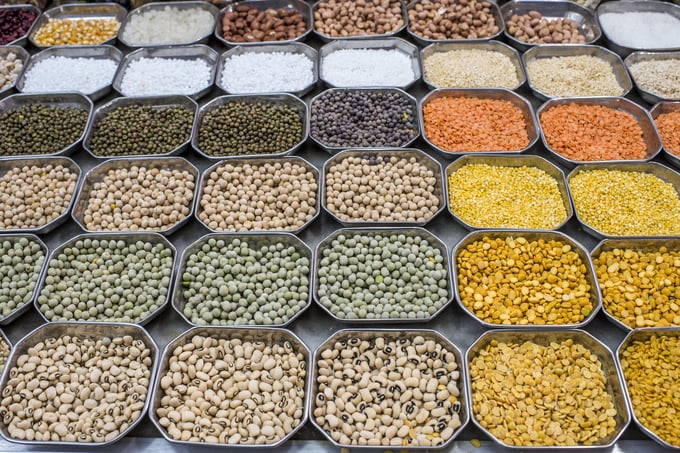May 16, 2025 | 10:04 GMT +7
May 16, 2025 | 10:04 GMT +7
Hotline: 0913.378.918
May 16, 2025 | 10:04 GMT +7
Hotline: 0913.378.918

Diversity of pulses at a market in India.
A global event at the headquarters of the Food and Agriculture Organization of the United Nations (FAO) today highlighted the role of pulses in maintaining soil health and providing vital nutrition to communities worldwide, under the theme 'Pulses: Nourishing Soils and People'. The event was held ahead of World Pulses Day 2024 which is observed every year on 10 February.
Pulses, such as beans, chickpeas, and peas, are a subgroup of crops belonging to the legume family harvested for their edible seeds, and they are regarded as nutritious foods for both human and environmental health. In the context of soils, pulses play a vital role by providing essential nutrients, maintaining soil biodiversity, and enhancing soil structure.
Many pulses species are drought tolerant and resilient to adverse climate, such as drought and heat. Their cultivation optimizes fertilizer use, thus reducing greenhouse gas emissions.
"Their versatility and resilience can improve both the health of our soils and of local communities. The climate crisis, biodiversity loss, and soil erosion and degradation are key challenges, and pulses can be part of the solution. Their ability to thrive in diverse climates, together with their nitrogen-fixing properties, makes them very valuable,” Director-General QU Dongyu said in his opening remarks at the event.
A global celebration to raise awareness and act
The FAO Director-General reiterated FAO’s commitment to supporting farmers and working with researchers and stakeholders to unlock the full potential of pulses.
He emphasized the need to further expand the availability of pulse genetic resources, invest in research and innovation, upscale technologies and agricultural techniques, and improve the production, harvesting, processing, and marketing of pulses.
Keynote addresses were delivered by SHINDO Mitsuaki, Minister Counsellor and Deputy Permanent Representative of Japan to FAO; Leonard Mizzi, Deputy Director - European Commission, Directorate F, DG International Partnerships; Jens Busma, Head of Agriculture and Rural Development Division, Federal Ministry for Economic Cooperation and Development (Germany) and Vijay Iyengar, President, Global Pulse Confederation.
Chikelu Mba, Deputy Director, Plant Production and Protection Division, FAO, moderated a session featuring expert technical presentations. Topics covered included the utilization of pulses for soil improvement in Latin America and Africa, as well as the enhancement of nutrition through pulses.
Fatimata Cheiffou, Ambassador, Permanent Representative of the Republic of the Niger and Chair of the World Pulses Day Steering Committee, delivered closing remarks.
Pulses and soil
Pulses improve soil health by hosting helpful bacteria, called rhizobia, in their roots. These bacteria convert nitrogen from the air into fertilizers in the soil. Additionally, other bacteria and fungi help release phosphorus in the soil, providing essential nutrients for plants and promoting soil diversity. The fertilizers produced by pulses benefit not only the pulses, but also other crops grown alongside them, reducing the need for chemical fertilizers. This makes pulses ideal for sustainable farming practices like intercropping or crop rotation.
Nutritional and economic benefits
Pulses are affordable and nutrient dense, making them a crucial protein source for populations with limited dietary options. On average, pulses contain 19 to 25 percent protein, with newly developed varieties surpassing 30 percent. Their high nutritional value makes pulses valuable for improving the diets of people who lack a diversified diet enriched with meat consumption. Additionally, pulses and their by-products are utilized as animal feed.
The value chains of pulses also play a significant role in job creation and livelihood support. This particularly benefits rural women, youth in farming communities, and urban families involved in processing and marketing value-added products.
Since the United Nations General Assembly designated 10 February as World Pulses Day, after the successful implementation of the International Year of Pulses in 2016, FAO has been at the forefront of raising public awareness regarding the importance of pulses. This involves their role in fostering efficient, inclusive, resilient, and sustainable agrifood systems, and their contribution to achieving the Sustainable Development Goals (SDGs). In this regard, FAO has implemented projects worldwide such as the one in Latin America and the Caribbean to improve family farmers’ capacities to sustainably produce native pulse crops and boost nutrition in the region.
(FAO)

(VAN) Fourth most important food crop in peril as Latin America and Caribbean suffer from slow-onset climate disaster.

(VAN) Shifting market dynamics and the noise around new legislation has propelled Trouw Nutrition’s research around early life nutrition in poultry. Today, it continues to be a key area of research.

(VAN) India is concerned about its food security and the livelihoods of its farmers if more US food imports are allowed.

(VAN) FAO's Director-General emphasises the need to work together to transform agrifood systems.

(VAN) Europe is facing its worst outbreak of foot-and-mouth since the start of the century.

(VAN) The central authorities, in early April, released a 10-year plan for rural vitalization.

(VAN) Viterra marked a significant milestone in its carbon measurement program in Argentina, called Ígaris, reaching 1 million soybean hectares measured.